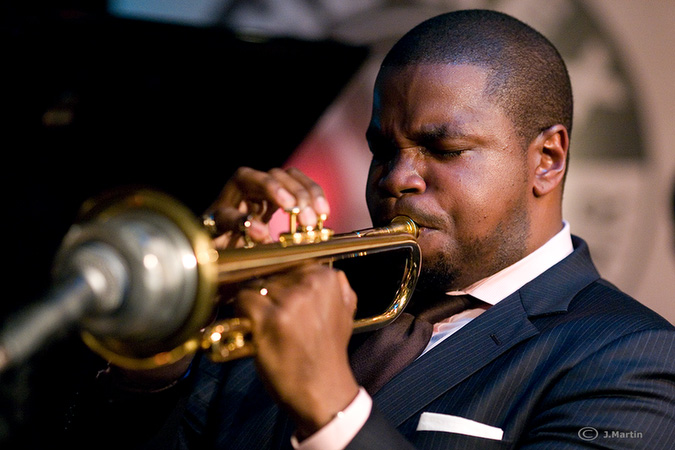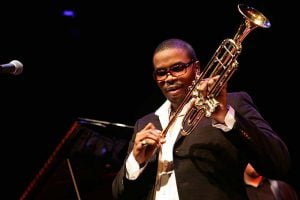Jazz interview with jazz trumpeter, producer, educator Jeremy Pelt. An interview by email in writing.
JazzBluesNews.Space: – First let’s start with where you grew up, and what got you interested in music?
Jeremy Pelt: – I grew up in LA and also in NY. My music teachers got me interested in music.

JBN.S: – What do you love most about your new album 2018: <Noir en Rouge Live in Paris>, how it was formed and what you are working on today.
JP: – I love that it shows how far the music and band has advanced since the previous album. The release of this album gives all my fans that haven’t yet experienced the band live a glimpse into what a typical set is for us.
JBN.S: – Which are the best jazz albums for you of 2017 year?
It’s may be to his answer, but it seems to us that he does not listen to others, or he thinks that he can not name other names. They shade themselves?
JBN.S: – What’s the balance in music between intellect and soul?
JP: – I don’t know that it should be thought of as a “balance”. I think all musicians throughout the beautiful history of this art form have always been innately intellectual. Soul is what adds the spice to the presentation. Bird was an intellect. Dizzy was an intellect. The list goes on and on.
JBN.S: – Please any memories from gigs, jams, open acts and studio sessions which you’d like to share with us?
JP: – Back in 2001, I recorded a record with Ralph Peterson called “Art of War”. There were 11 songs on the CD. It took us 3 hours to record the record, including a lunch break!
JBN.S: – Many aspiring musicians are always looking for advice when navigating thru the music business. Is there any piece of advice you can offer to aspiring students or even your peers that you believe will help them succeed and stay positive in this business?
JP: – One of the things I feel is very helpful is for the musician to learn the ins and outs of the music business and also learn how to have a good rapport with club owners and presenters. Basically, to be successful you have to think about yourself as a product and ask “Why would people want to see me?” , “Why SHOULD people see me?” and “what is my brand (what am I selling?). Also, they should know how to improve their brands.
JBN.S: – Аnd furthermore, can jazz be a business today or someday?
JP: – As long as the music is profitable, almost by definition, it’s already a business.
JBN.S: – Which collaboration have been the most important experiences for you?
JP: – The years I spent playing with the icons that I’ve listened to for years on my favorite recordings. People like Louis Hayes, Cedar Walton, Jimmy Cobb, Roy Haynes, Freddie Hubbard, Benny Golson, and many more.
JBN.S: – How can we get young people interested in jazz when most of the standard tunes are half a century old?
JP: – Standards are really just a way to test ones harmonic efficiency on familiar material. It’s a musical litmus test. For me, even as a kid, standards weren’t what got me into jazz, it was the performance of the standards by the musicians that played them. I think young people are getting more and more into jazz, but that’s because what “Jazz” has become nowadays is more inclusive of a wider array of other genres. In the past, “Jazz” could sometimes be intimidating because you were more encouraged to be stoic while listening to it. These days, it’s enticing because there’s a lot more cross-pollinating happening.
JBN.S: – John Coltrane said that music was his spirit. How do you understand the spirit and the meaning of life?
JP: – That really is a deep question with an answer that can’t be fit into words. One has to live a long time to discover what the meaning of life is, and I’m only 41 years old.
JBN.S: – What are your expectations of the future? What brings you fear or anxiety?
JP: – Becoming obsolete both contributes to my anxiety and fuels my creativity.
JBN.S: – If you could change one thing in the musical world and it would become a reality, what would that be?
It’s may be to his answer, but …
JBN.S: – What’s the next musical frontier for you?
JP: – You’ll have to wait and see.
JBN.S: – Are there any similarities between jazz and world music, including folk music?
JP: – Jazz is world music. So is folk. We’re doing music a disservice by separating it by genres.
JBN.S: – Who do you find yourself listening to these days?
It’s may be to his answer, but … or a mystery, or … not possible speak about it.
JBN.S: – What’s your current setup?
JP: – For the past few years I’ve been playing Harrelson Custom Trumpets, built by the brilliant Jason Harrelson who now resides in Colorado. Most recently, I’ve added a Swiss trumpet called “Galileo” from a company in Basel.
JBN.S: – Let’s take a trip with a time machine, so where and why would you really wanna go?
JP: – The 50s.
JBN.S: – I have been asking you so far, now may I have a question from yourself …
It’s may be to his answer, but …
Interview by Simon Sargsyan
P.S.: – But as a musician, I like at Jeremy Pelt jazz music very much and listen to his music, jazz. I am enjoying her jazz in festivals with pleasure.







More Stories
Interview with Janis Siegel of The Manhattan Transfer: Jazz, being a more refined, interpreted form of music
CD review: George Benson – Dreams Do Come True: When George Benson Meets Robert Farnon – 2024: Video, CD cover
The band was tight as ever. The Warren Haynes Band cuts loose: Video, Photos